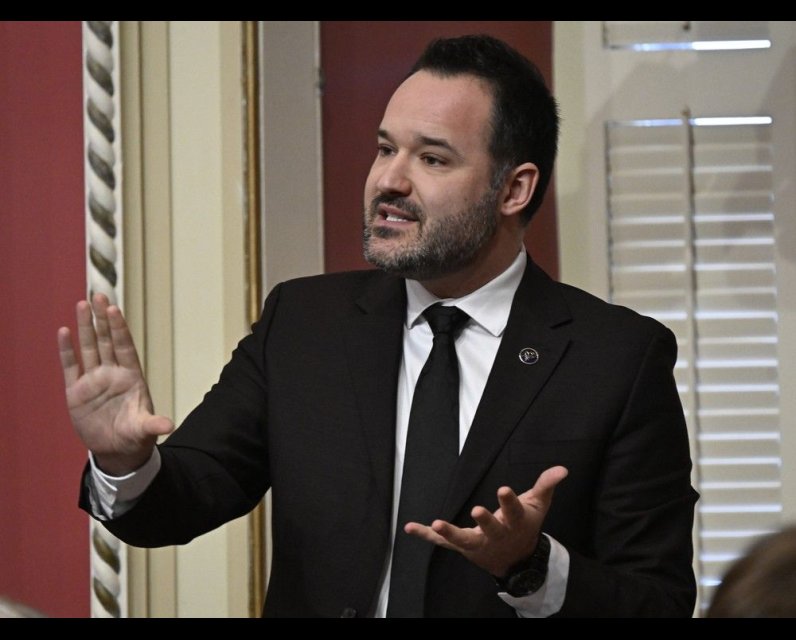Source Feed: National Post
Author: Antoine Trépanier
Publication Date: May 26, 2025 - 04:00
Quebec's proposed French-language quotas for streaming giants could spark a constitutional battle
May 26, 2025

OTTAWA — The Quebec government wants major digital platforms to emphasize and boost access to francophone content and is ready to penalize them if they don’t oblige.
And it could set up a constitutional battle with the federal government.
When the Quebec Minister of Culture and Communications Mathieu Lacombe outlined his government’s intentions regarding the streaming giants earlier this week, Peter Menzies thought: “Oh boy, here we go.”
The former vice chair of Telecommunications at the Canadian Radio-television and Telecommunications Commission (CRTC) saw the province —again — acting and asserting powers over what seems to be a federal jurisdiction.
“There’s constitutional issues over who has jurisdiction over communications and broadcasting control,” he told National Post.
Bill 109 would allow the government to set quotas for francophone content such as music, films and television series on streaming platforms like Netflix, Spotify, Apple Music and YouTube.
Those platforms would also have to offer an easier way for users to find francophone content.
“We can’t choose something that isn’t offered to us. We can’t like something we don’t know,” Lacombe said earlier this week.
“Access to our culture, to films, to TV series, to songs in French, it must be easy, it must be simple when we’re in Quebec,” he added.
If Bill 109 is passed
, it would establish the “quantity or proportion” of original French-language content that must be offered on digital platforms with a default French-language interface. It would also enshrine the right of access to French-language cultural content in the Quebec Charter of Human Rights and Freedoms.
Lacombe’s argument is based on data that isn’t very encouraging for Quebec’s cultural sector. Citing government data, Lacombe claims that 92 per cent of young people have difficulty identifying French-language cultural goods available on online platforms.
Of the 10,000 most-streamed songs in Quebec in 2023, only five per cent were French-language titles from the province. Not so long ago, in the era of compact discs, Lacombe said, one in two sales was by a Quebec artist. Currently, among the 50 most-streamed songs online in Quebec, there is only one song in French.
“The challenges facing our cultural businesses are numerous, from audience renewal to ensuring adequate funding,” said Eve Paré, the executive director for l’Adisq, an association representing more than 200 companies in the music industry.
“This is a clear symbol that the Quebec government has taken note of the situation prevailing in our industry,” she added.
So the government is adopting a firm approach, including quotas. Lacombe wouldn’t say what they were, but they would be determined through regulations. If the law is not respected, individuals and companies could face administrative sanctions up to $15,000 and criminal sanctions up to $300,000.
Michael Geist, a law professor at the University of Ottawa, believes that if these services were required to respect certain quotas, they might decide, rather than comply, to simply exclude users whose billing address is in the province. That means a user in Gatineau would not have access to the streaming service, while an Ottawa resident, less than a kilometre away, would.
That’s because, according to Geist, the wording of the bill requires a certain percentage of French-language content on a streaming service, which has the effect of removing content in English or not. The companies will therefore shut down the service in Quebec or remove English-language content in Quebec.
“That’s why I think it’s a content removal bill,” said Geist.
“I will not say to block the English content. It sounds a little belligerent. I wouldn’t say that. I would say it’s more about putting our content forward,” said Lacombe at his press conference Wednesday.
Meanwhile, many companies and the federal government are watching this very closely.
“We will carefully review the proposed legislation,” YouTube Canada spokesperson Simon Langlois said in an email to the National Post.
It appears the province is once again feuding with Ottawa over provincial powers. The provincial bill apparently overlaps with the federal Broadcasting Act. Bill C-11 overhauled the Act in the last Parliament to ensure that platforms contribute to the creation, promotion, and dissemination of Canadian culture.
“Our government firmly believes that Canadian content should be easily accessible on streaming platforms, and in Canadians’ official language of choice,” said Vanessa Cranston, a spokesperson for Minister of Canadian Identity and Culture Steven Guilbeault.
The minister, we’re told, has taken note of the Quebec government’s bill and his department “will be examining it in depth.”
Guilbeault, who is also Prime Minister Mark Carney’s Quebec lieutenant and a popular political figure in the province, is expected to address this shortly, we’re told.
“There is no negotiation to be had with Ottawa. We are within our area of jurisdiction, so we legislate within our area of jurisdiction,” said Lacombe.
According to Geist, it all depends on how you frame the argument. If you argue that internet streaming constitutes broadcasting, then the power would rest with the federal or provincial government. “It’s not a shared responsibility,” Geist said.
Broadcasting is under federal jurisdiction. Therefore, if internet streaming is considered broadcasting, the powers could rest with the federal government, not the provinces. But if it’s anything other than traditional broadcasting, this calls into question the constitutionality of federal Bill C-11 and opens the door to the constitutionality of provincial legislation.
“It seems to me difficult to argue that both can be constitutional because it’s either broadcast or it isn’t, which then means it’s either federal or provincial,” said Geist.
According to Menzies, the biggest risk is that what Quebec believes it needs will be applied across the country.
“When Quebec still goes ahead and asserts its own authority in that area, it has a great risk of duplicating the regulation in that area, which causes confusion for the in this case, the streaming sector,” he said. “And does the CRTC end up just following Quebec’s lead and doing what their legislation wants?”
But for the Quebec government, it’s all about protecting its language and its culture.
“Quebec is today and will always remain the best judge of the state of its language and culture. We are a fully sovereign nation when it comes to our culture,” Lacombe said.
National Post
atrepanier@postmedia.com
Get more deep-dive National Post political coverage and analysis in your inbox with the Political Hack newsletter, where Ottawa bureau chief Stuart Thomson and political analyst Tasha Kheiriddin get at what’s really going on behind the scenes on Parliament Hill every Wednesday and Friday, exclusively for subscribers Sign up here.
Our website is the place for the latest breaking news, exclusive scoops, longreads and provocative commentary. Please bookmark nationalpost.com and sign up for our newsletters here.
OC Transpo warned customers on Thursday of slower service on Line 2 for much of the day.. Read More
May 29, 2025 - 09:58 | Norman Provencher | Ottawa Citizen
Out of the blue, the City of Ottawa has implemented tighter security measures that could turn city hall into something of a forbidden territory. Residents must reject the new policy because there is no justification for it. Read More
May 29, 2025 - 09:40 | Christina Spencer, Ottawa Citizen | Ottawa Citizen
The O-Train Line 2 is experiencing a switch issue at South Keys Station that is causing delays for travellers, the head of Ottawa's transit services said.
May 29, 2025 - 09:10 | | CBC News - Ottawa




Comments
Be the first to comment